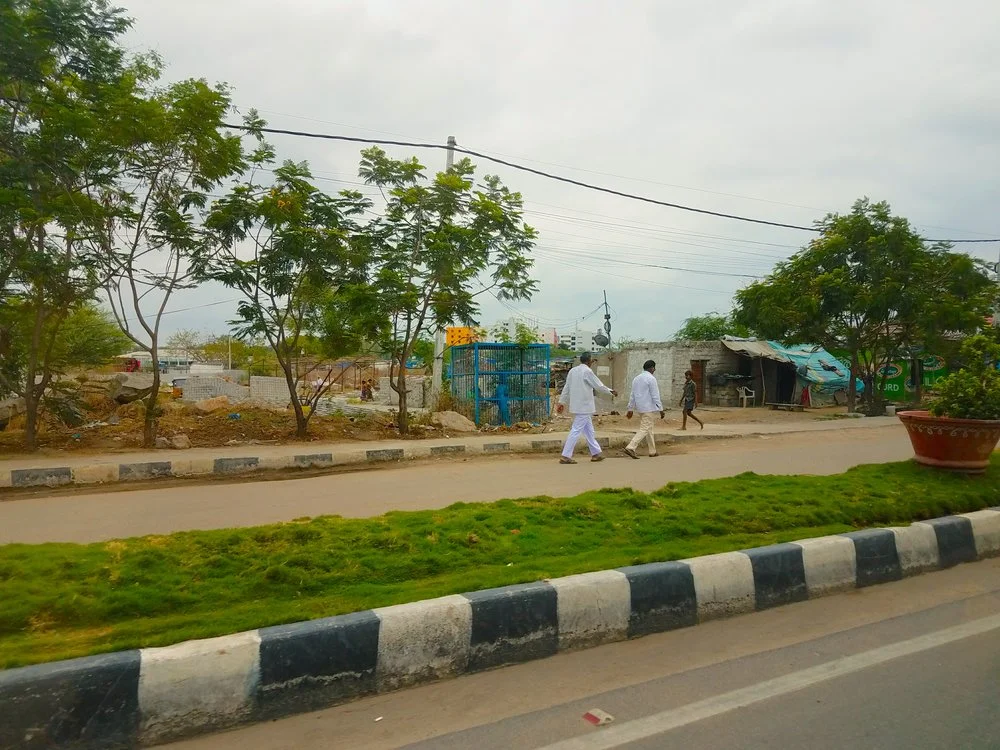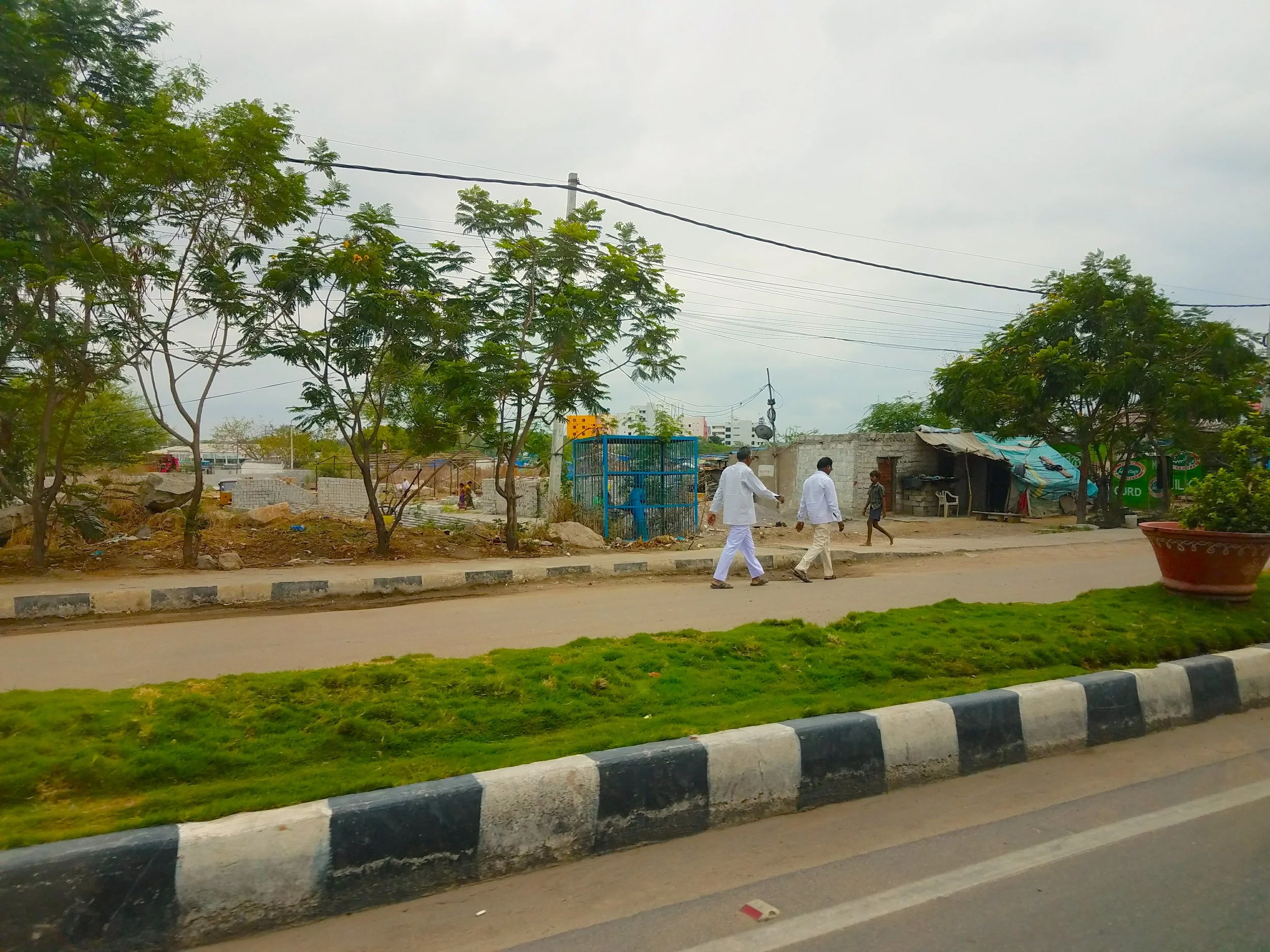Hello from Hyderabad, India
Today marks my fifth day in Hyderabad, India’s “city of pearls,” biryani capital, and its second Silicon Valley. Here are some thoughts, observations, and learnings from the city I will call home for the next two months.
Today marks my fifth day in Hyderabad, India’s “city of pearls,” biryani capital, and its second Silicon Valley. Here are some thoughts, observations, and learnings from the city I will call home for the next two months.
Locals walking alongside one of Hyderabad's main roads. / June 11, 2017
It’s a man’s world.
Men. Men everywhere. Men on motorcycles. Men in rickshaws. Men standing idly on the street. Men in cafes. Groups of men on buses and just about anywhere you look for that matter. The interesting thing is that you’ll find most men in western dress, wearing button-downs or t-shirts and jeans. And the women? The few women you see commuting are almost always in vibrant traditional Indian clothes, sporting comfy kurtas and stylish saris. They are like rainbow sprinkles on the rocky Hyderabadi road.
SLOW: City “under construction.”
The most striking thing about Hyderabad is its stark contrasts, irrespective of the neighborhood you find yourself in. On any given street, you can find an imposing, modern high rise next to an abandoned plot full of piled up stones and rubble, which is in turn next to shacks made of corrugated metal and plastic sheets. Ten years ago, the new “tech city” was non-existent. Today it is absolutely chaotic, but also one of India’s up-and-coming urban centers.
Holy cow (and bull)!
I had heard the stories about how cows are sacred in India, and how they roam about freely through the streets. Still, it never occurred to me that bulls would receive the same treatment. Much to my surprise, on the first day in Hyderabad, I spotted beige cows and jet black, horned bulls wandering about on the side of the street – sometimes alone and sometimes being led by locals. Who knows, I may be spotted at some point swinging my bright red raincoat on the streets of Hyderabad, shouting olé as I dodge a raging bull’s advances.
Everyone is praying for monsoons.
Expecting to melt away with the hot Indian sun, I have been pleasantly surprised to find relatively mild, warm weather. With monsoon season underway, the first rains poured down, cooling the city. A close friend told me,
“You’ll see, everything here depends on how good the monsoons are. Good rains mean good crops – and low inflation.”
The same day, a colleague related the monsoon to microcredit loan default rates: in years of good monsoons, rural farmers have plentiful harvests and loan repayment rates are near 100%. In bad years, however, default rates rise – this is one of the risks that microfinance firms must factor into the risk premiums for their loan products (and one of the subtle aspects I will have to consider for the next two months).
I couldn’t be more excited to work at Vaya FinServe this summer. I’ll be helping them think through how they should launch individual loans to enable many more Indians at the base of the pyramid grow their businesses and lead better lives.
Sasa from Nairobi!
Hello! My name is Anisha. I am a first-year graduate student at The Fletcher School and a Blakeley Fellow in 2014. This 'summer' (technically, it is winter where I am, south of the equator), I am spending my summer in Nairobi, Kenya conducting research on the impact of m-commerce in addressing some of Nairobi's most pressing urbanization challenges.
Let me tell you a little bit about myself first to set the context. I am from India, but have spent close to nine years studying, working and living outside the country. Most recently before Fletcher, I lived and worked in Singapore. At Fletcher, I am pursuing a master in international business, with a focus on strategy consulting, international finance and technology in development. You can read more about my background here if you are interested.
Coming into Fletcher, I was very keen to put my private sector experience to use in frontier markets. Having spent time in sub-Saharan Africa in 2009 as a Teaching Fellow at the Meltwater Entrepreneurial School of Technology in Ghana, I was interested in coming back to Africa. The Blakeley Fellowship gave me the the opportunity to pursue my career interests, and long story short, I landed up in Nairobi!
My research in Nairobi explores the innovative potential of m-commerce in bringing about fundamental change in issues of sanitation, water, transportation and retail in this rapidly urbanizing city. The questions I hope to answer at the end of the project are:
(1) While a lot of solutions are coming up via the mode of m-commerce, are they providing only symptomatic relief or actually creating long-term change?
(2) Who is spearheading innovation - small and medium enterprises, corporate players, public sector and/or NGOs? How is the government engaged and being engaged in these efforts?
(3) Who are the beneficiaries - low-income, middle class and/or high-income?
I am doing this research under the aegis of the Institute of Business at the Global Context or IBGC at The Fletcher School, with support from Mastercard Worldwide. Needless to say, there are a lot of knotty issues to think about as Nairobi urbanizes at a fast pace. Income and wealth inequality, governance, urban planning, infrastructure including but not limited to information and communication technologies (ICT) and human capital are but just a few.
I have now been in Nairobi for about two weeks. My research methodology involves conducting in-depth qualitative interviews with stakeholders from a variety of organizations including tech startups, corporate players, government, public sector, academia and consultancies. Of course, these interviews need to be structured in a manner that we can draw conclusions and insight in our analysis. Additionally, there is extensive desk research akin to a literature review that I am doing simultaneously. My fieldwork is estimated to be spread out over eight weeks, and in the two weeks so far, I have learnt some very interesting things.
I will report back with preliminary findings after some analysis (to the extent that I can share on a blog before the research is published :)), but here are a two of my broad takeaways:
(1) There is a tremendous amount of innovation coming out of Nairobi, but it is overwhelmingly focused on smartphones. This is not to say that "dumb" phones or basic feature phones are not getting connected to the throbbing pulse of trade and business in the city, but it is still limited. These observations come from a field trip of Kibera, Kenya's largest urban slums, where I interviewed several micro-entrepreneurs. As a corollary - and this is a hypothesis at this point - it would appear that beneficiaries are mainly from middle-income and high-income groups. It would be hard to say that the base of the pyramid is disadvantaged in a context where we are talking about a low-income country to begin with, and this stage of development, any income growth is a prerogative over addressing income inequality, but there is strong reason to probe whether low-income consumers are part of the growth story. Especially as I read Thomas Piketty's mind-opening book on the rise of income inequality that capitalism promotes (or at least does not negate), I find myself delving into question repeatedly.
(2) Safaricom - the leading telecom company in Kenya with a market capitalization worth 27% of Kenya's GDP - has engineered a revolution in how money is transacted by making it possible, easy, affordable and commercially viable and is at the forefront of catalyzing change. M-Pesa, their mobile payments system, is largely behind the transformation of Nairobi into a m-commerce leader. It is also a fundamental platform for most m-commerce businesses to convert consumer demand into real purchase. Having said that, m-commerce ideas have taken a life of their own, and are evolving in a very distinct manner that encourages consumption as opposed to plain vanilla savings (which is what M-Pesa was started to enable).
(3) I will also include a question here masquerading as a takeaway. I started out with the idea of understanding whether m-commerce driven change was having long-term or short-term impact, but I realize the need to think about whether it matters? In an environment where "smart" planning and execution is so far from reality, perhaps thinking long-term is not the solution. Perhaps, short-term solutions can create more tangible impact.
All in all, it looks to be an exciting summer, with a lot to learn about private sector development, entrepreneurship and technology in one of the foremost frontier markets in Africa.


